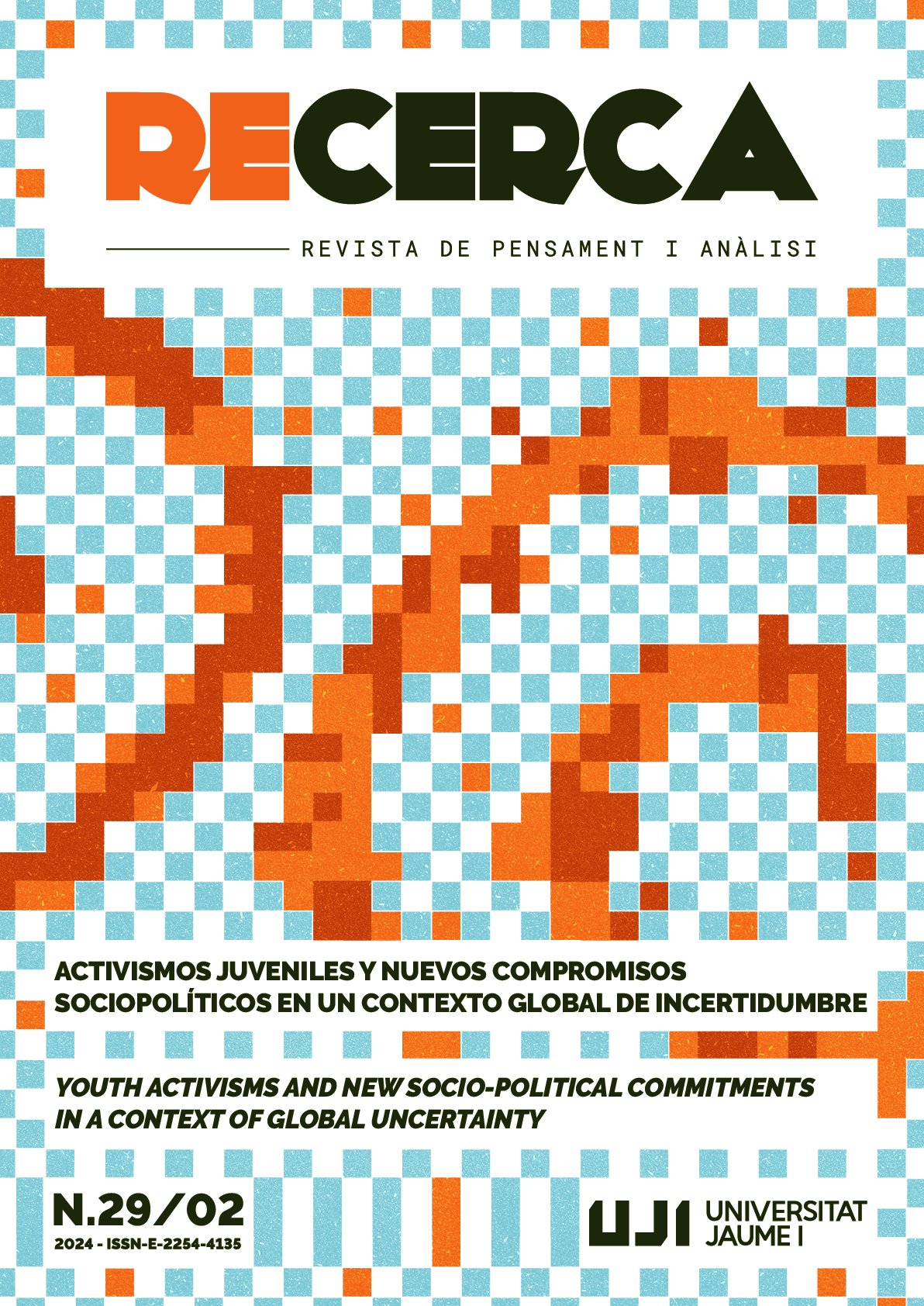How to resist? Postanarachafeminist theories and praxis for the 21st century
Main Article Content
Abstract
The present is characterized by the ontological crisis of the political subject and by the increasingly clear approach of radical political praxis to the libertarian thesis of rejection of the delegation of power and approach to direct action. Taking to the streets, assembly, direct action, individual insurrection, and daily resistance are some of the tools that characterize the new forms of resistance. However, where do these forms come from? This article aims to analyze the way in which poststructuralism, anarchism and intersectional and decolonial feminisms act as a source of inspiration for these new forms of radical political resistance.
Downloads
Article Details
References
Ahmed, Sara (2014). La política cultural de las emociones. México D.F.: Universidad Nacional Autónoma de México.
Alatas, Syed Farid y Sinha, Vineeta (2017). Introduction: Eurocen-trism, Androcentrism and Sociological Theory. En Sociological Theory Beyond the Canon (1-16). London: Palgrave Macmillan.
Alemán, Jorge (2019). Capitalismo: Crimen perfecto o emancipa-ción. Barcelona: Ned.
Barker, Drucilla K. y Kuiper, Edith (eds.) (2003). Toward a Feminist Philosophy of Economics. London: Routledge.
Berlant, Lauren (2020). El optimismo cruel. Buenos Aires: Caja negra.
Bey, Hakim (1991). Post-Anarchism Anarchy. TAZ. The Temporary Autonomous Zone, Ontological Anarchy, Poetic Terrorism.
Bordo, Susan (1986). The Cartesian Masculinization of Thought. Signs, 11(3), 439-456.
Braidotti, Rosi (2020). El conocimiento posthumano. Barcelona: Ge-disa.
Broncano, Fernando (2018). Cultura es nombre de derrota. Cultura y poder en los espacios intermedios. Salamanca: Delirio.
Brown, Wendy (2019). Estados del agravio: poder y libertad en la modernidad tardía. Madrid: Lengua de Trapo.
Despentes, Virginie (2020). Teoría King Kong. Barcelona: Random House.
Donoso, Alfonso (2020). New Politics: Sovereignty, Representation, and the Nonhuman. En Valera, Luca y Castilla, Juan Carlos (eds.). Global Changes (vol. 46, 45-55). London: Springer International Publishing. https://doi.org/10.1007/978-3-030-29443-4_5
Extinction Rebellion ES (s.f.). Nuestros principios. Recuperado de: https://www.extinctionrebellion.es/sobrexr.html
Ferber, Marianne A. y Nelson, Julie A. (eds.) (1993). Beyond econom-ic man: Feminist theory and economics (144-153). Chicago: The University of Chicago Press.
Foucault, Michael (2012). Historia de la sexualidad I. La voluntad del saber. Madrid: Biblioteca Nueva.
Gómez Villar, Antonio (2022). Los olvidados. Ficción de un proleta-riado reaccionario. Barcelona: Bellaterra.
Hekman, Susan (2000). Beyond identity: Feminism, identity and identi-ty politics. Feminist Theory, 1(3), 289 308. https://doi.org/10.1177/14647000022229245
Ibáñez, Tomás (2015). Anarquismo es movimiento: Anarquismo, neoanarquismo y postanarquismo. Barcelona: Virus.
Kropotkin, Piotr Alekseevich (1977). Ética: Origen y evolución de la moral. Madrid: Dogal.
Laclau, Ernesto y Mouffe, Chantal (2001). Hegemony and socialist strategy: Towards a radical democratic politics. London: Verso.
Lyotard, Jean-François (1989). La condición postmoderna: Informe sobre el saber. Madrid: Cátedra.
March, Artemis (1982). Female Invisibility in Androcentric Sociologi-cal Theory. The Insurgent Sociologist, XI(2), 99-107.
May, Todd (1994). The Political Philosophy of Poststructuralist An-archism. Pennsylvania: Pennsylvania State University Press.
Merchant, Carolyn (2020). La muerte de la naturaleza: mujeres, ecología y revolución científica. Granada: Comares.
Mitzman, Arthur (1977). Anarchism, expressionism and psychoa-nalysis. New German Critique, 10, 77-104.
Morris, Bethany (2014). “Bitch in Heat”: Psychology’s Pathologiza-tion of Female Sexuality. En Transgressive Womanhood: Inves-tigating Vamps, Witches, Whores, Serial Killers and Monsters (211-219). https://doi.org/10.1163/9781848882836_021
Morris, Bethany (2017). We’ve always been borderline: Understand-ing the site of a radical subjectivity. Free Associations: Psychoa-nalysis and Culture, Media, Groups, Politics, 71, 51-64.
Newman, Saul (2001). From Bakunin to Lacan: Anti-authoritarianism and the dislocation of power. New York: Lex-ington Books.
Newman, Saul (2011). Postanarchism: A politics of anti-politics. Journal of Political Ideologies, 16(3), 313 327. https://doi.org/10.1080/13569317.2011.607301
Nhanenge, Jytte (2011). Ecofeminism: Towards integrating the con-cerns of women, poor people, and nature into development. Maryland: University Press of America.
Parker, Ian y Pavon-Cuéllar, David (2021). Psicoanálisis y revolución. Santiago de Chile: Pólvora Editorial.
Pérez Orozco, Amaia (2014). Subversión feminista de la economía: aportes para un debate sobre el conflicto capital-vida. Madrid: Traficantes de sueños.
Ramnath, Maia (2019). Non-Western Anarchisms and Postcolonial-ism. En Levy, Carl y Adams, Matthew S. (eds.). The Palgrave Handbook of Anarchism (677-695). Cham: Springer Internation-al Publishing. https://doi.org/10.1007/978-3-319-75620-2_38
Truth, Sojourner (2020). Ain’t I a Woman? London: Penguin UK.
Valdés, Alicia (2022, abril 23). Lo políticamente posible y lo mediáticamente correcto. Público. Recuperado de: https://blogs.publico.es/otrasmiradas/59063/lo-politicamente-posible-y-lo-mediaticamente-correcto/
Veselka, Vanessa (1999). The Collapsible Woman: Cultural response to rape and sexual abuse. Bitch Magazine, 9. Recuperado de: https://www.bitchmedia.org/article/the-collapsible-woman
Williams, Rhonda M. (1993). Race, Deconstruction, and Feminist Economic Theory. En Ferber, Marianne A. y Nelson, Julie A. (eds.). Beyond economic man: Feminist theory and economics (144-153). Chicago: The University of Chicago Press.


